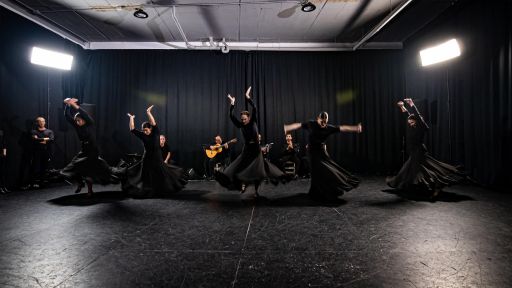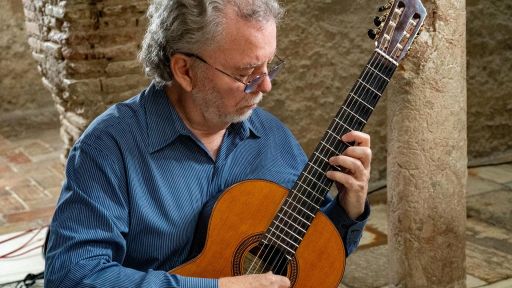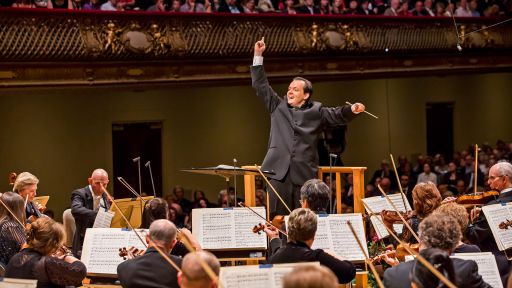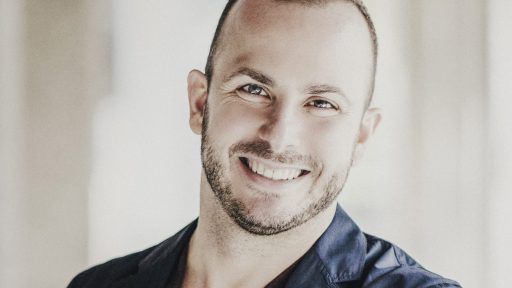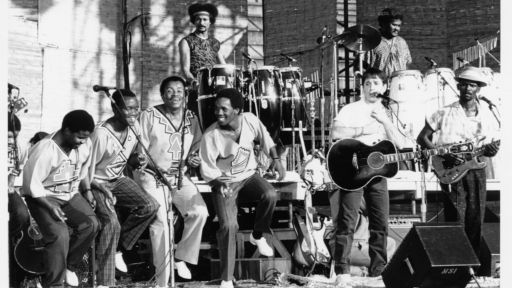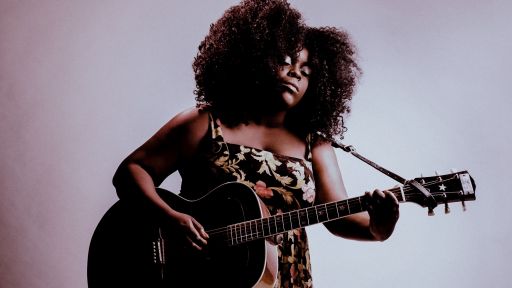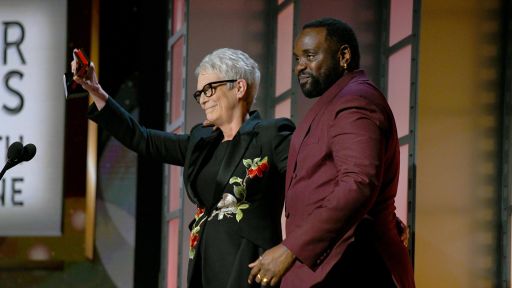TRANSCRIPT
♪ Scott Yoo: Coming up on "Great Performances," I'm Scott Yoo.
Isaac Albéniz was a Spanish composer who drew his inspiration from Spain.
Man: And he tried to capture, let's say, the essence of Spain.
He was trying to get all of these colors of our country into his music.
[Piano plays] Yoo: He created hundreds of musical portraits of its cities and towns, mostly in Andalusia.
Woman: The real reason why I brought you here is because the guitar would sound amazing here.
Yoo: To appreciate how he did it, I needed to understand the character of its people... La guitarra... digamos que te saca el alma.
[Bells tolling] Yoo: the personality of its cities... the flavor of its heritage.
[Men singing in Spanish] Come with me on "Now Hear This" to get to know Albéniz through "Portraits of Spain."
♪ ♪♪ Major funding for "Great Performances" is provided by... ...and by contributions to your PBS station from viewers like you.
Thank you.
[Piano playing] ♪ Yoo: Spain.
I first came here a few years ago to get to know the music of Domenico Scarlatti, and since then, it's been etched in my memory... the light... the landscape... the architecture... the food... the music and dance.
All of these inspired a late 19th-century composer Isaac Albéniz to capture them in musical portraits of Spain.
40 years ago, Manuel Barrueco adapted the piano works of Albéniz for the guitar.
Today, Juan Pérez Floristán champions them on their original instrument.
Manuel and Juan would be my guides to Albéniz.
♪ Bravo.
Thank you.
Beautiful.
So Albéniz.
I don't know his music very well.
Tell me about him.
Well, he's probably the greatest, most famous guitar composer that never wrote for the guitar.
[Laughter] I mean, he mainly composed for this instrument, for the piano, because he was himself a virtuoso, a piano virtuoso, and he tried to capture in his music, let's say, the essence of Spain.
For example, you have the Phrygian mode, which is so typical from flamenco, which sounds like this.
♪ Not only that.
he tried to capture the spirit of some cities from Spain.
He composed pieces naming them Sevilla, Cadiz, um, Jerez, Asturias, many, many of them.
So he was very interested in Spain as a source of inspiration for his music, and of course, another source of inspiration for him was the king of the Spanish instruments, which is the Spanish guitar, la guitarra española.
The open strings, the tremolando, the arpeggios, the repeated notes, all of that you would rarely find in music before this revolution, but after Albéniz, that became a typical thing for Spanish composers to do.
And It's funny.
The repeated note...
Yes.
you know, the one note repeated, that's a very difficult thing in the piano, and that's an easy thing on the guitar.
♪ ♪ So that's much harder on the piano, I would imagine.
It is, it is.
Hands overlap constantly, and then we have the jumps.
You have it in the same place.
We don't.
If you want, I can show you now "Asturias" on the piano.
Please, yeah.
How it sounds.
♪ ♪ Yoo, voice-over: Only a Spanish composer would write a piano piece so inspired by the guitar that it fits better on that instrument.
Albéniz created music with such Spanish personality that to fully appreciate it I'd need to understand the personality of Spain itself... ♪ and I'd start with its sound, its soul, the guitar, and with the people who bring it to life.
In Granada, Manuel and I went to see one of Spain's great makers and philosophers of the guitar Rafael Moreno with Deya Pijuan, who runs the Institute for the Promotion of the Guitar.
Es muy importante amar tu profesión, creo.
Hacer la cosa bien... Hacer la cosa bien cuesta menos que hacerla mala.
Yo no quiero dinero; yo lo que quiero dejar un legado.
He restaurado unas guitarras de maestros antiguos, y he aprendido mucho.
Ole.
Porque una guitarra, cuando la abra, es como un libro.
Si sabes leer, no?
Nice.
Cada guitarrero lo da una forma diferente?
Sí, cada uno es personal en su trabajo.
OK. Que debe de ser así, creo yo.
Como incluso tocar la guitarra.
El mismo instrumento en dos manos distintas no sonará igual.
La misma obra.
La guitarra, creo... digamos que te saca el alma.
Si tú eres agresivo, tocas agresivo.
Si eres dulce, tocas dulce.
La sacará más seguro.
Just like everything in life.
Practicamente.
Toda la vida.
Would you like to play one of his instruments?
I would love to play one of his instruments.
Yoo: ¿Está bien?
Vale.
Sí.
[Manuel playing guitar] ♪ ♪ Yoo: Outside of Granada, in the tiny town of Lanjarón, we visited husband and wife guitar makers Ana Espinosa and René Baarslag.
The beginning is that.
Is this made from a tree?
From animals.
This is just like, uh, Stradivari or other violin makers?
I mean, this is the same now that it was 300 years ago, 400 years ago.
Yes.
Yes.
Incredible.
Yes.
Ha ha ha!
So every time you use this glue, you have to do it fast.
Yes.
Otherwise, it's no good.
No.
And What if you put it in the wrong place?
No, it's not possible.
You cannot make a mistake.
No, you can't.
♪ ♪ René: The inlay in the top of the guitar, it's more like a signature from the guitar builder than the signature that's on the paper.
This one is something you invent yourself.
This mark.
How many little wooden dots are there in this, just what I'm holding?
That's 120, 240, I think.
This is 240 dots?
No, maybe more.
[Laughter] ♪ Yoo: Is it a lonely life to be a guitar maker?
René: It's a lonely work, yes, but on the other hand, it's-- it's like a meditation job.
You can't work a little half-hour in this work.
You have to work 2 or 3 hours, and you get in a very profound concentration, which is not possible in much jobs, which is the good side.
And of course, it changes because you work with your wife.
Yeah, but you can concentrate.
We see each other most of the day, so--ha ha--there's no problem in the concentration, but it's better to be together, yeah.
Yoo: What is it like to hear your own instrument being played for you?
He play, but I don't play, but when I'm listening to Manuel, for example, it's very magical, no?
This work, and finally Manuel is coming, and he's playing.
Ha ha!
♪ ♪ Back in Granada, Deya took us to the Bañuelo, an ancient Moorish bath.
Deya: It was built around the 11th or the 12th century, and it was used throughout until the 16th century.
A bath, meaning you took a hot bath here?
Oh, yes, yes, yes.
You have the hot caldera, the hot boiler under it.
People would come here, have the hot bath, the warm bath, the cold bath.
It's a spa.
Yeah, basically.
But the real reason why I brought you here is because I think, Manuel, that a guitar would sound amazing here.
Really?
You think so?
In this space, yes.
Let's give it a try.
♪ ♪ Yoo: Above Granada, we'd visit its great Moorish palace, the Alhambra, famed for its architecture and design, with historian and guide, María José Rubio.
This looks like classical Spanish design, to me anyway.
Yeah, but it all comes from the Moorish, the Muslim times.
They used the two basic shapes of geometry, which is the circle and square.
For example, if we see the star here, it's an 8-point star, which is made with a circle and two squares rotated inside the circle.
Mmm.
Nice.
And is that deliberate?
Yes, because for a square, it represents Earth, the four cardinal points, and the circle represents heaven.
What about the colors?
Tell me about the colors.
They are based on the rotation and translation we can find now in geometry, and we didn't know that until we had computers.
That's why we have congress of mathematicians coming to study the Alhambra because it's all here.
There are mathematical riddles encoded in the walls?
Yes.
Really?
It's not improvised.
Really?
It's theoretical, yes.
All mathematics, basically.
That's incredible.
Come on.
I'll show you more.
OK. Maria: So this is the traditional architecture in their houses.
Very humble in the outside, and all the wealth and the beauty in the inside.
Yoo: Yeah.
You can't tell how beautiful this is from the outside.
Maria: So we have here another of the palaces where we can enjoy the views of the old city of Granada.
Before this was built, that was the old city.
Yoo: This view out there is incredible.
So actually, we have a big footprint of this culture, for example, in our language.
One of the most beautiful, my favorite word in Spanish, is ojalá.
Comes from lau sha Allah, ojalá, God willing.
It's Arabic.
It's Moorish origin, and we use that nowadays a lot actually, but also other words like, for example, algodón.
It's al quatan, it's cotton.
I see.
Your cotton.
Alcohol is from al kuhul, alcohol.
Alcohol is a Moorish word.
Yeah.
No kidding.
Almost all the words beginning with al comes from... Algebra.
Yeah, algorithm.
Algorithm.
Yes.
No kidding.
All the words like azúcar.
It comes from al sukar, sugar.
How many Moorish words made their way into the Spanish language?
It's about 10% of the Spanish vocabulary... That's a lot!
That's a lot.
comes from the Andalusian Moorish dialect.
No kidding.
Also in our character, we have the Mediterranean character all around the Mediterranean.
We say, "One face, one race."
It's in our genes.
Yoo: We explored this with Juan at the Foundation of Three Cultures, which celebrates the Moorish, Jewish, and Christian cultural exchange of the Mediterranean.
[Juan playing piano] ♪ ♪ Bravo.
Thank you.
So That was the "Albaicín."
Have you been to el Albaicín?
Is that the thing you can see from the Alhambra?
Absolutely.
It's incredible.
Stunning, right?
It's incredible.
So Albaicín was the Arabic Moorish quarter, neighborhood.
You can see that when you walk through it, the streets, how they are like this and so narrow, and, you know, even the mystery of what are you going to encounter around the corner.
I think that mystery, it's very well encapsulated in the beginning of the piece of "El Albaicín."
♪ It's this mysterious theme.
You don't know what's going to happen, and then mayhem unfolds, all the music, the sound, the fire, and comes this.
♪ And listen to this scale.
♪ It's the Moorish quarter, no doubt about it, but the other thing is that this piece, "El Albaicín," is so pianistic.
Now, you take "Torre Bermeja," for example, another piece by Albéniz, and there you still find this mixture of pianistic style but also guitaristic style.
For example, for me, the beginning would sound perfect on a guitar, which does like this.
♪ ♪ Doesn't it?
Manuel: Yeah, it does.
So do you play those notes when you play this piece?
Yeah, I do.
It's just that the order of the notes.
You know... Ah!
you have these groups of 3s, you know, and the way it is, the second, third, and... ♪ Ta ka ta da da da da ♪ And then guitar that becomes-- You don't do that?
It's possible, but it becomes very awkward.
Can you show me?
Yeah, sure.
This is what's written.
That's not good?
Is that comfortable for you?
Not at all.
Ha!
OK.
So what do you play?
I do.
Aha.
Slightly different.
But you see, I think at the end of the day, composers are trying to use our instruments to get to an idea which is unattainable.
Even the middle section.
Is that pianistic, guitaristic, or even maybe it's a singer accompanied by a guitarist, like a serenade.
♪ And the singer on top of that or even two singers.
You could imagine two female singers singing.
♪ A man responds.
♪ Wow.
He really pushed the piano to its limits.
Absolutely.
Imagination is more powerful than instruments, I would say.
Beautiful.
[Manuel playing guitar] ♪ ♪ ♪ ♪ ♪ Yoo: You know, I heard that Córdoba was at one point the most advanced city in the world.
Manuel: It was!
And they were ahead in many fields-- math, science, the arts, also literature.
They translated a lot of the Greek works into Arabic, and then other Europeans would translate into their languages.
It was apparently also very beautiful, very clean.
They had running water, they had sewage, so it didn't smell like I know like a lot of other cities did at the time.
So It's my understanding that this place is called the Alcázar of the Catholic Kings.
So it's already a combination of Moorish, "alcázar," and Catholicism.
This is the start of the Catholic era of Spain.
That's correct, yeah.
And it's fascinating to me.
You see the layers of civilization.
There's the Roman layer with the pillars, and then there's a Moorish layer, and then suddenly after that, you have the Catholic layer.
Actually, I'm told that inside is the desk on which Columbus signed the agreements for his trips to the New World, so-- In this building?
In this building, yeah.
It's incredible.
You want to go inside?
Yeah.
[Manuel thumps guitar] [Thump] ♪ Manuel: This place is also a museum, and this here, it's a second-century Roman, actually a floor, that was found in Córdoba in '59, and it was brought and assembled here.
Wow.
Can you imagine how difficult this was to put back together and not on a floor, on a wall?
I cannot imagine.
It's impossible.
So Córdoba really was a melting pot of first the Romans, then the Moorish influence, then the Christian influence.
There's a Jewish influence, too.
As well, yes.
And now us.
♪ ♪ ♪ ♪ ♪ [Tolling] ♪ ♪ [Juan playing piano] ♪ ♪ ♪ Yoo: Early in the morning, at the famous fish market of Jeréz, probably the only one in the world where the fishmongers sing for their supper, chef Julián Olivares is their first customer, in search of the freshest seafood.
♪ [Man singing in Spanish] [Piano continues] ♪ Ha ha ha!
[Cheering] ♪ Yoo: Jesús, what fish do you have here?
Esto es maravilloso todo.
Tengo pescado y marisco muy fresco y muy bueno.
Is that boquerones?
Boquerones.
Boquerones plateado.
Mi favorito.
Ha ha!
Y el mío.
Where did this fish come from?
¿De donde viene esto pescado aquí?
De aquí de la zona.
Son todo de aquí de la bahía.
From the bay here.
El Golfo de Cádiz.
Sí.
Julián: El pescado se ha traído de un barco esta noche, y ahora lo tenemos aquí.
Jesús: Yo me he levantado a las 3:30 para comprar a las 5:00.
De todo lo que compro diariamente, lo mejor se lo selecciono a él.
He gets the best of what he buys.
Julián: Esta tarde vamos a comer pulta.
Yoo: OK. Langostinos?
Langostinos.
Excelente.
Y un poquito del atún.
Atún de almadraba, que es de aquí solamente.
Es una forma de captura de tenemos aquí en la bahía.
También lo vaís a probar.
Perfecto.
Muy bien.
Yoo: The seafood may be as local as you can get, but the other ingredients are also a part of a shared heritage.
So what are you making for us?
Julián: Lo que vamos hacer es un tartar de langostinos, envuelto con un atún de almadradaba.
Hacemos una leche de tigre como se fuera un ceviche, que aquí también nosotros tenemos tradiciones de allí, del Peru.
Entonces, solo estos se lo agregamos.
So this is a ceviche, a little bit?
Como una especie de ceviche.
Correcto.
OK. Un poquito de tomate, que previamente los hemos escaldado.
Tomatoes also came from the new world, right?
Claro, pero estos no.
Estos los hemos comprado.
Pero el origen, sí.
Vinieron de allí.
And certainly, Tabasco Sauce comes from America.
Un toquecito de picante, sí.
Lo que hacemos es, macerar un poquito, y en esta lamina de atún lo que hacemos es.
Manuel: Eso se ve increíble.
Lo que hacemos es hacer un rollito.
Tenemos un ajo blanco.
Esto es: pan, ajo, unos cacahuetes, y melón.
También los cacahuetes son del nuevo mundo, no?
Claro.
Y el chile también?
El chile también.
And chile also.
In a certain sense, almost all food is a fusion between sort of the New World and the Old World.
Tenemos un unión, siempre vinculado uno con otro, y tenemos tendencias.
Y ahora mismo pues la verdad que si.
I think what happened is the countries, European countries, had their colonies, and it expanded their taste.
Their palate.
Yeah, sure.
Mira.
Que bonito.
Beautiful, huh?
Es demasiado bonito para comer.
No, hay que comerlo siempre.
I'll eat it.
Don't worry about it.
Y ahora vamos a saltear lo pescado que hemos comprado.
OK!
Piensa?
Muy bien.
♪ [Sizzling] ♪ ♪ Y esto, lo tapamos un poquito, dos minutos.
Y ahora, vaís al comedor y yo llevo la comida.
Muchas gracias!
De nada.
Gracias.
OK. ♪ ♪ ♪ ♪ Bravo.
So that's a barcarolle.
It's a barcarolle, yes.
It's a boating song.
Yeah.
You can really feel the ship kind of swaying back and forth when you play.
That's what I'm trying to do, to make it swing like that.
It's actually called "Mallorca," right?
"Mallorca."
Which is an island, right?
It is an island in the Mediterranean.
It's so interesting.
Obviously, the sea, the ocean is such a source of life for us, but it's also a source of culture.
Yeah.
Right.
I mean, We got language in the Americas from Europe.
We got music, we got food, but it also went the other way around.
Well, you know, a good example is the tango by Albéniz that we're going to play because the tango developed from the habaneras.
The habaneras is Havana songs, you know.
Oh, habanera, Havana.
Yeah.
Havana in Spanish is Habana con "b."
So habanera is what it is.
Oh, right.
At that time, Cuba was Spain.
Cuba was actually the last colony.
So there you can see, going to one port first, then to Argentina, and then back to Spain.
Well, let's play the-- Yeah, let's do it.
All right.
I'll get my violin.
All right.
♪ ♪ ♪ ♪ [Applause] Yoo: Oh, here it is.
Bueno, ha llegado.
Solamente queda, comerlo.
Bravo.
Bravo.
OK.
Fantastic.
Muchas gracias.
Gracias!
OK. let's eat.
All right.
[Hoofbeats] Juan: Here in Spain, the sense of place, belonging to a specific place is very important.
For example, when you read about Rafael Nadal, the tennis player, you usually read, "Rafael Nadal, Mallorca."
It's very important to mention where are you specifically in Spain.
Usually, I'm asked, "Oh, so where do you come from?"
And then I say, "Sevilla," and I can see their faces going on like they're imagining, "Oh, Sevilla!"
Because, you know, it conjures up different images if you are from Granada than if you are from Santiago de Compostela.
And that was also a very clear thing for Albéniz.
For us, at least Spaniards, it puts you in a mindset almost.
It's like you have certain images about those cities.
I don't know if the same thing happens to you, for example.
I mean, now that we've been in Andalusia for a while, I can really feel what it means to be in a place like Seville.
Absolutely.
You can relate to that sense of place we have.
[Manuel playing guitar] Juan: So, guys, why don't we go inside the Alcázar de Sevilla?
Do you know it?
No, I have never been in it.
Well, it's one of the most beautiful monuments in Spain.
It's here in Seville, and it's in the style Mudéjar because the Christian kings did it but in the style of the Moor people that were beforehand.
♪ ♪ Manuel, voice-over: So This is actually the Manuel de Falla Auditorium, which was built upon his house.
His house is right below us here.
He spent here many years, and it was one of his most productive years of his life as a composer.
Yoo, voice-over: We met Juan again, this time in Granada, to talk more about pride of place.
Yoo: So, Juan, we're here in De Falla Hall.
Why are we in De Falla Hall?
Juan: Well, Manuel de Falla is one of our main figures in our musical history in Spain.
We had many so-called nationalist composers, which had a different meaning back then.
I'm talking about 19th, 20th century.
We have Albéniz, Granados, Turina, and Manuel de Falla.
It's also true that they were not the first ones.
Like, They had a previous mentor or teacher, who was Pedrell.
Actually, I don't know if you know him.
Never heard of him.
Well, Pedrell, he's not such a great composer, not at all, but he was a great teacher, and he was the first one to start thinking, "OK, Brahms, Wagner, all of those are great, "but they're German, "and when I compose 'classical music,' let's say, "shouldn't I go to my own musical roots, "like the folklore I grew up with?
"Maybe our folklore is a valid source "of inspiration for composing.
"Maybe that's the source of inspiration I should be using."
And that's kind of revolutionary back then, and maybe Manuel de Falla was the one who tried to go maybe deeper, to go back in time to the more primitive stuff of our folklore of Spanish sounds.
So he sounds harsher, harsher than Albéniz, for sure.
Actually, that's why nowadays audiences maybe they tend to prefer Albéniz, which sounds like-- I don't know-- it's like smelling some flowers, some roses, the red wine in a salon.
And de Fallas' music is more a strong cognac.
It's harsher.
It's more even cubist like Picasso.
So Manuel de Falla actually his main piece for piano solo is called "Fantasía Bética."
He could have called it "Spanish Fantasy," "Fantasía Española," but it was "Fantasía Bética" because Betis was the Latin Roman name that was given to this area of our country, to the south of Spain, to Andalusia.
So he's going to this even archeologist's sense of, like, this is the real stuff.
Mmm.
Are we going to hear this real stuff right now?
Absolutely.
Fantastic.
And by the way, there's one word I didn't mention, which is flamenco, which all of these composers loved, and it was a great influence for all of them, but maybe Manuel de Falla was the one to best capture its spirit.
♪ ♪ ♪ ♪ [Camera shutter clicking] Can you imagine if this were your backyard?
I would love that.
Ha ha ha!
You know, It's amazing that we're here on top of La Plateria, which is the most famous flamenco peña in the world.
Really?
Yeah.
And The biggest influences in flamenco, we have the gypsy neighborhood, we have the Moorish, the Alhambra, the Jewish neighborhood, and then the Christians.
So flamenco is a mix.
It is, it is.
Actually, we need to go, because we're going to hear a performance.
Let's go.
OK, let's do it.
OK. Yoo, voice-over: Downstairs in the Plateria's main room, we'd meet musicians Antonio "El Turry," Vero La India, and José Fermín Fernández, to hear the sound that inspired the nationalist composers.
[Tapping flamenco beat] [Guitar playing] ♪ ♪ [Shouts] ♪ ♪ Yoo: Antonio, qué es el flamenco?
El flamenco es una forma de vivir en nuestra cultura.
Their way of life, their culture.
Es la forma con la que nosotros ganamos la vida.
Y bueno, una forma de sentir, también.
Es nuestro vida, en resumen, la verdad.
El flamenco, como toda la música, tiene un origen.
Y uno de sus grandes orígenes del flamenco, y del cual nacen mucho de los grandes estilos, o de los "palos" que hay, es la soleá.
Y en mi humilde opinion, es la madre del flamenco.
Manuel: This is the cante jondo, which means the deep song, which is the basis of all flamenco.
Y vamos a cantar un poquito por soleá.
Amable.
♪ ♪ [Vocalizing] ♪ ♪ ♪ Me preguntan si te quiero ♪ ♪ Y yo digo que ni verte ♪ ♪ ♪ Yo digo que ni verte ♪ ♪ Yo digo que ni verte ♪ ♪ Te quiero más que a mi madre ♪ Yoo, voice-over: In this deep song, I could hear it all-- the Spanish scale of the guitar, the Moorish call to prayer, the culture and pride, a mixture that could only come from this place.
♪ Estas jugando conmigo ♪ ♪ Como quien juega ♪ ♪ Al billar ♪ ♪ ♪ Como quien juega al billar ♪ ♪ Como el que juega ♪ ♪ Al billar ♪ ♪ Pero te voy hacer una ♪ ♪ Que tiene ser sonada ♪ ♪ Pero te voy hacer una ♪ ♪ Que tiene ser sonada ♪ [Stomp, feet tapping] [Percussion playing] ♪ Yoo: Úrsula López is the artistic director and choreographer of the legendary Ballet Flamenco of Andalucía.
Úrsula: Paso, paso.
Golpe, golpe.
♪ ♪ ♪ [Applause] Yoo: Bravo.
Fantástico.
Bravo, bravo.
Gracias, gracias.
Qué es el Ballet Flamenco de Andalucía?
El Ballet Flamenco de Andalucía es una institución cultural del gobierno de Andalucía.
Su función es la puesta en valor y la preservación del flamenco.
So this is a government institution that preserves flamenco.
Yes.
It's amazing.
Cuanto años.
Tiene 30 años ya.
30 years.
Increíble.
¿Porque Albéniz es importante en España?
Desde todos los tiempos, desde hace más de cien años, que trabajamos con Albéniz, es un clásico, es una seña de identidad también de nuestro país, de España, de Andalucía, y del flamenco.
Porque para mi Albéniz era flamenco.
¿Cuál es el proceso, después de escoger una obra de Albéniz, como presentarla?
Los guitarristas han hecho una adaptación de esa música de Albéniz, a la guitarra, con las palmas, el cajón, dándole un aire más flamenco.
¿Y que vamos a ver ahora?
Ahora vamos a ver una pieza que me encanta de Albéniz, que es El Puerto.
OK. Venga, vamos chicos!
[Percussion playing] ♪ ♪ ♪ Yoo: Getting closer to the people, the character, and the spirit of Spain has given me a clearer picture of Albéniz and his musical portraits, and it's given me an idea.
If and when I compose my own music, what portraits of what places might I paint?
Maybe we'll both find out next year on "Now Hear This."
I'm Scott Yoo.
♪ ♪ Announcer: To order "Now Hear This" on DVD, visit ShopPBS or call 1-800-PLAY-PBS.
This program is also available on Amazon Prime Video.
♪ To find out more, visit pbs.org/greatperformances, find us on Facebook, and follow us on Twitter.
♪ ♪

